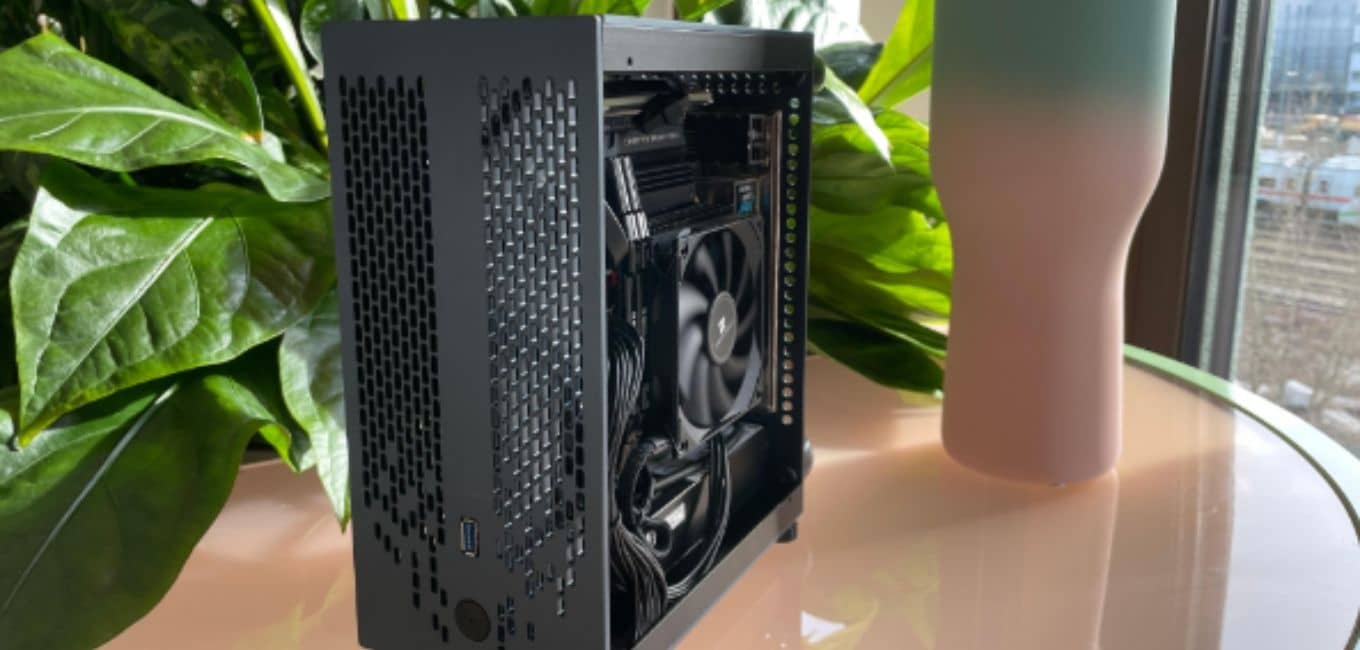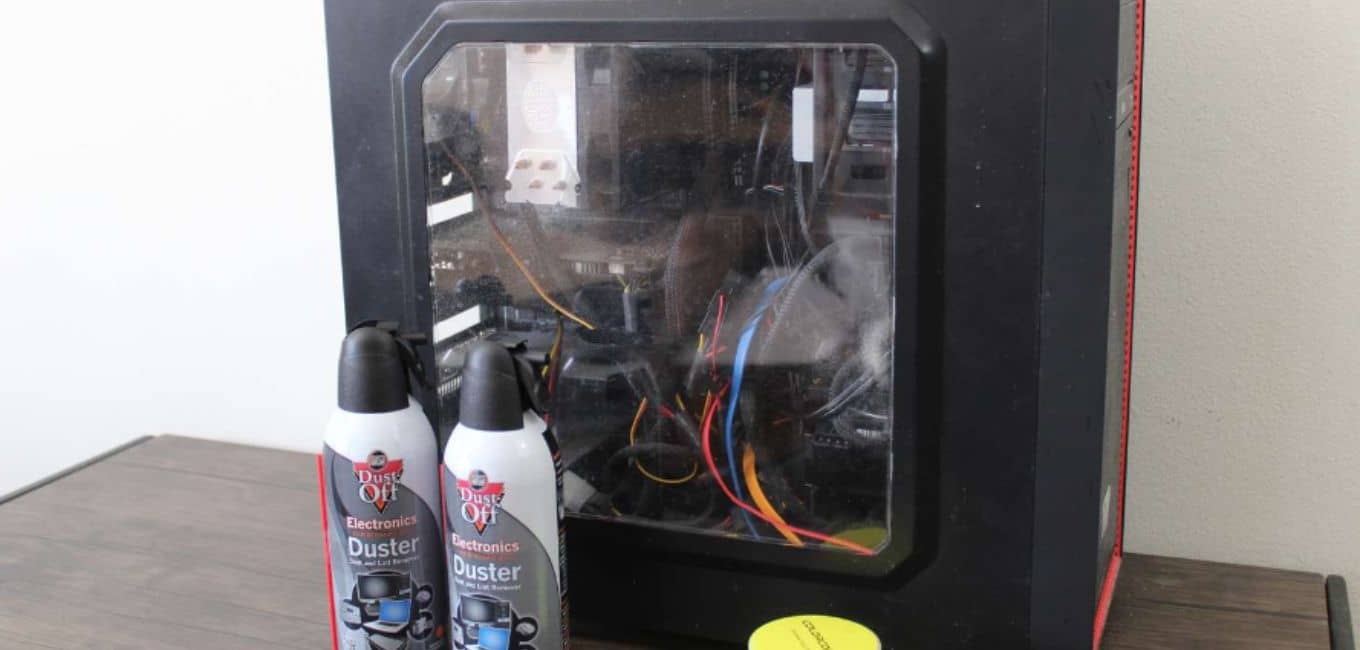With smaller gaming PCs, laptops, and All-in-Ones, the dust build-up very quickly blocks up the narrow channels for airflow. This reduces the performance of your cooling fans, and thus they must run harder. Eventually, they pull the dust directly onto the heatsink blades themselves, which drastically reduces the transfer of heat from the metal to the air.
Again: Fans must crank harder. Eventually, they just can’t push enough air to make up for the dust, and so the CPU or graphics card must slow itself down so it produces less heat. If it’s on the edge of where it needs to slow down (like, sometimes too hot, sometimes not), you’ll notice stuttering or jumpy performance in what you do, instead of the gradual reduction of performance overall.
For components such as the hard drive or motherboard, which often are simply passively cooled by the natural airflow of the case, they can’t crank a fan up to maintain proper temperatures, and often can’t reduce their performance to reduce heat output. They die very quickly. The number of motherboard and hard drive replacements I’ve had to do in All-in-One desktops is excessive.
You’re not necessarily always risking catastrophic failure of components, but you are reducing your gaming machine’s performance and longevity by failing to clean them.
Dust Proof PC Case
Virtually every custom PC case on the market today ships with PC dust filters over all intake vents. This will significantly reduce the amount of dust that enters the PC, provided you maintain positive pressure. This will also make it virtually impossible for larger objects, debris, or insects, to get inside.
This isn’t foolproof, of course, as insects may wander in through an unfiltered vent that would normally expel hot air. However, I have never seen this happen on my personal machine. And while it won’t be as thorough as the ShopShield that will look significantly better.
Keep in mind that these filters will need cleaning every so often, depending on how dusty your desk is. I’d expect to need to clean them every couple of months. With this in mind, be aware that in some cases, the dust filters are harder to access than in others. The easiest cases to access dust filters that I’m aware of are the Fractal Design Define R5 and R6, which have a bottom filter that slides out from the front, and a front filter that you can pop out once you open the front door.

8 Best Ways To Get Rid Of Dust
Dust can build up inside a PC over time, which can cause issues such as overheating and reduced performance. Here are some tips to help prevent dust from entering your PC:
1. Become a Clean Freak
Thoroughly dusting all the surfaces of the home once or twice weekly will go a long way toward eliminating dust.
Always use a damp cloth, which helps avoid distributing mites through the air, and wash the cloth at high heat or dispose of it after use.
2. Use A Hair dryer
The best way I found is to have an air blower, a bit like a much more powerful version of a hair dryer without the heat. Take the PC outside on a table and blow away as much dust as possible. It’s worth stopping the computer fans from rotating when you do so to prevent the fan motors from generating any electricity. I find that I still have to clean the fan blades by hand with a damp cloth. But the blower generally removes 90% of the dust. The blower is great for cleaning the dust filters. If the PC is on the floor it’s worth dusting every month. For PCs on desks, you can do it less frequently maybe every 2–3 months.
3. Clean your PC Regularly
Regular cleaning is important to prevent dust buildup. Use a soft-bristled brush or compressed air to blow dust out of your PC’s case and components. Be sure to turn off your PC and unplug it from the wall before cleaning.
4. Replace thermal paste
The thermal paste between the CPU and heatsink can also attract dust and reduce cooling performance. Replace the thermal paste every few years to maintain optimal cooling performance.
5. Keep your PC in a clean and dust-free area
Try to keep your PC in a clean and well-ventilated area where there is less dust accumulation. Avoid placing your PC on the floor or near a window, as this can increase the amount of dust that enters the case.
6. Vacuum
Another option is to literally open up your PC and vacuum the unit very carefully. While effective, this solution is plagued with its own problems. Off the bat, it’s grossly inefficient especially if you have more than a couple of PCs to manage. In a manufacturing, machine shop, or food production environment, how many man-hours do you want to devote to cleaning your PCs? And how often? Are you losing money while that machine is out of action? How many times can you clean a PC before a human error cracks a motherboard, knocks a RAM stick, or otherwise damages the delicate innards of your computer?
By following these tips, you can help prevent dust from your PC and ensure that it continues to perform well.
7. Keep your PC off the floor
If you can avoid it, don’t have your PC sitting on the floor because the lower down it is, the more susceptible it will be to sucking in dirt from the floor, including dust, pet hair, and general debris.
The best place for your computer is up on the desk. If you can’t do this, have it at least six inches above the floor.
8. Check your flow
Achieving positive airflow inside the computer case will also aid in keeping pesky dust out of the case. What do I mean by positive airflow? The term essentially means you have more fans pulling air into the case than you have extracting hot air from within, resulting in increased pressure. Negative airflow would be when you have more fans extracting air out from the case itself. Having multiple intake fans on your PC with filters attached, alongside a fan or two on the rear to remove hot air from inside the case will help prevent dust build-up, from entering any open ports. More air movement helps components dissipate heat as well, so it’s a win for everyone.
There’s a neat way you can check how air is being moved around your PC case — smoke. Light an incense stick and this will show you how air is moving through any open ports on your case, which should provide helpful hints as to how you need to balance out airflow to ensure as much air is running through filters as possible.
How to Keep Dust Out Of Gaming PC – FAQs
Conclusion
The build-up of dust can negatively impact your computer’s performance in 2 main ways: it causes the components of your computer to retain heat and it makes it more difficult for the internal fans to dissipate heat from the system, thereby decreasing the efficiency of the entire system.
Cleaning your gaming hardware system isn’t the most exciting part of gaming, but it is a necessity if you want to keep your system running at peak performance and prevent it from overheating. If your computer was overheating before, you’ll notice that it’s a thing of the past after a good clean. The extra time that you take to clean up the inside and outside of your gaming PC will ensure that it’s running at maximum capacity and thus will improve your gaming experience. We recommend cleaning your computer every three to six months to improve the pressure cooling system, keep the performance up, and increase your machine’s overall lifespan.

